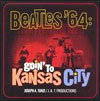On their inaugural tour of the United States, the Beatles attracted capacity crowds at every concert except for the Children’s Mercy Hospital benefit held in Kansas City, Missouri on September 17, 1964. The crowd of 20,207 was just over half of Municipal Stadium’s estimated capacity of 35,000 with seats installed on the field.
The low attendance did not result from Kansas City residents dislike of the Beatles or ailing children; rather, the Beatles were caught in the crossfire of local animosity toward Charles O. Finley. Finley, owner of the Kansas City Athletics professional baseball team since 1960, brought the Beatles to Kansas City by guaranteeing payment of $150,000 out of his own pocket, regardless of ticket sales. At the time, it was the highest price ever paid for a single performance of any band. Finley rationalized the concert with the slogan, "Today’s Beatles Fans Are Tomorrow’s Baseball Fans."
Instead of building hype for the popular rock band, the local media (especially The Kansas City Star) viewed shunning the Beatles as a way to protest Finley’s unpopular management of the Athletics. Besides the team’s losing record, Finley stirred feathers with his notorious gimmicks to attract fans. The schemes included dressing the team in gaudy green and gold uniforms, paying the players extra to grow mustaches, releasing sheep to graze in the outfield during games, having the team ride into the stadium on mules, and using a robotic rabbit to deliver balls to the umpire.
With widespread resentment toward Finley fueling the boycott, a shortage of Beatles ticket sales cost Finley $40,000 in addition to $25,000 minimum donation that he pledged to Children’s Mercy in the event that the concert did not earn a profit.
The boycott did not entirely prevent fanatic fans from flocking to the concert though. Hundreds stormed the stage just before the concert, delaying its start time by several minutes before the loudspeaker announcer threatened to cancel the event altogether. The city placed 350 police officers on duty for the duration of the Beatle’s stay to manage the crowds.
Newspaper articles reveal a generational divide as older residents worried that the “youngsters” attending the rock concert would cause a riot or damage their hearing in the loud stadium. Some adults who attended the concert complained that the music was just “noise” or that they could not understand the lyrics. Other newspaper articles ponder whether the Beatles had received haircuts since they left London.
While the media fixated on all of the issues surrounding the concert, the fans themselves delighted in witnessing the live performance of 12 hits of the Beatles including Ticket to Ride, Can’t Buy Me Love, and A Hard Day’s Night. In addition to the standard Beatles repertoire, they also performed Kansas City/Hey-Hey-Hey-Hey for the hometown crowd. The most dedicated Beatles fans will recall the emblematic press conference given by the Beatles at the Hotel Muehlebach. A full recording of that interview is currently sold on compact disc under the title Beatles ’64: Goin’ to Kansas City.

View images of Charles Finley and Municipal Stadium, part of the Missouri Valley Special Collections Digital Gallery:
Check out the following books and magazine articles for more information on the Beatle’s inaugural tour, Charles O. Finley, and the Kansas City Athletics.
- Ticket to Ride: Inside the Beatles' 1964 Tour that Changed the World, by Larry Kane.
- How They Became the Beatles: A Definitive History of the Early Years, 1960-1964, by Gareth L. Pawlowski.
- Seasons in the Sun: The Story of Big League Baseball in Missouri, by Roger D. Launius. See pp. 61-64 for a concise description of Finley’s antics.
- The Kansas City Athletics: A Baseball History, 1954-1967, by John E. Peterson. See pp. 118-223 for a substantial history of Finley’s management years.
- “Tale of Two Cities,” by Osborn Elliott. This Newsweek magazine article gives a detailed description of Charles Finley’s antics.
- “The Night the Beatles Bombed,” by Tom Leathers. The Squire magazine reports the description of the local politics surrounding the Beatles visit.
- Kansas City: An American Story by Rick Montgomery and Shirl Kasper. A summary of Finley’s tenure in Kansas City and a news clipping from the Beatles concert appear on pp. 290, 293.
- The Kansas City A's and the Wrong Half of the Yankees, by Jeff Katz. The relationship between the Athletics and the New York Yankees before Finley arrived in Kansas City is discussed by the author.
References:
DeAngelo, Dory. What About Kansas City!: A Historical Handbook. Kansas City, MO: Two Lane Press, 1995:97.
Elliott, Osborn. “Tale of Two Cities,” Newsweek 66 (May 27, 1963):2-28.
“Kansas City's 10 Top News Stories for 1963.” The Kansas City Star (January 1, 1964):4.
Launius, Roger D. Seasons in the Sun: The Story of Big League Baseball in Missouri. Columbia, MO: University of Missouri Press, 2002:61-64.
Leathers, Tom. “The Night the Beatles Bombed.” The Squire (May 2004):19-27.
Montgomery, Rick and Shirl Kasper. Kansas City: An American Story. Kansas City, MO: Kansas City Star Books, 1999:290, 293.
Peterson, John E. The Kansas City Athletics: A Baseball History, 1954-1967. Jefferson, NC: McFarland & Co., 2003:118-223.

